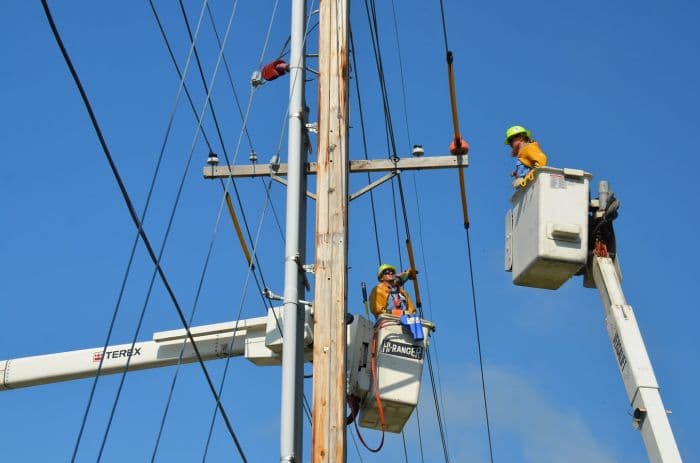Concrete-Adjacent: Being a Reinforcing Ironworker
By Editorial Team
Updated on July 25, 2025

Interested in working with concrete? As part of the many construction trades in Quebec, ironworkers are considered pillars of the industry. Reinforcing ironworkers are responsible for designing, fabricating, and installing reinforcing steel bars (rebar) in concrete structures, shaping their duties as crucial components when it comes to ensuring the stability and durability of buildings and infrastructures.
This article will focus on trade-specific details, responsibilities, and required skills for becoming an ironworker in Quebec, as well as said trade’s importance for the province’s industry and economy.
Being a Reinforcing Ironworker

Ironworkers or reinforcing ironworkers are professionals specializing in installing reinforcing steel bars on construction sites requiring reinforced concrete.
Install rods, metal wire meshes, and any other similar material to reinforce concrete. Rebar is made in steel mills and varies in size from 10 millimetres to 55 millimetres.
Cut, bend, lay out, weld, place, and install reinforcing steel rods used to build concrete forms, columns, beams, and slabs, as well as any other similar work. The rebar is cut, bent, and laid out in factories by manufacturers according to pre-established plans provided by engineers.
Make and install pieces of rebar and pre-fabricated components via ligatures, welding, or mechanical couplers.
Install mechanical joints, anchors, and dowels.
As such, being a reinforcing ironworker is an essential construction industry trade.
Responsibilities of a Reinforcing Ironworker
Reinforcing ironworkers are tasked with making, cutting, assembling, and installing rebar meant for concrete structures, such as foundations, slabs, posts, beams, and walls. Said rebar reinforces concrete, allowing structures to withstand load constraints, seismic forces, and extreme environmental conditions.
Reinforcing ironworkers must be able to read engineer-designed plans and construction sketches, follow precise guidelines, and use specialized tools like shears, benders, and welders to make rebar according to specifications. They must also abide by construction worksite safety standards, collaborate with other building trades, and work with others to guarantee the quality and conformity of the work being done.
The Importance of Reinforcing Ironworkers for Quebec’s Economy and Construction Industry
Reinforcing ironworkers operating in the construction industry are major stakeholders when it comes to building high-stake construction projects in the province, such as residential buildings, public infrastructures, bridges, tunnels, and civil engineering work. Their expertise in terms of steel rebar contributes to the stability, durability, and safety of concrete-based structures, ensuring their resilience against heavy loads, vibrations, and bad weather.
On top of contributing to the quality of construction projects, reinforcing ironworkers actively participate in creating jobs locally, growing the construction industry prospects, and further developing trade-specific skills. Their meticulous and precise work is indispensable for ensuring standards are respected in terms of quality, safety, and durability, as mandated by work providers, engineers, and regulatory authorities.
How to Become a Reinforcing Ironworker in Quebec

In Quebec, one must have a diploma of vocational studies (DVS/DEP) in installing concrete reinforcements (official course: Pose d'armature du béton). Said training lasts 735 hours—six months—and helps students acquire the necessary knowledge, skills, and aptitudes for installing rebar for slabs, beams, walls, seating, stairs, columns, and post-tensioning elements. It also educates trainees regarding:
How steel-reinforced structures are erected;
How rebar is made;
How to apply mathematical knowledge, read plans, and health and safety rules.
The Skills Needed to Become a Reinforcing Ironworker
Said trade mandates a whole lot of technical, physical, and cognitive skills. Reinforcing ironworkers must have in-depth knowledge when it comes to materials, construction standards, and welding techniques to make and install steel rebar in compliance with stability and safety requirements. They must be able to read and interpret plans, calculate quantities and dimensions, and work with precision to comply with engineering tolerances and technical specifications.
Reinforcing ironworkers must also be in pretty good physical shape, as said trade often means lifting heavy loads, working in uncomfortable positions, and heading to remote construction worksites that may be difficult to access. Moreover, good communication and problem-solving skills, as well as time management aptitudes are essential for ensuring an effective collaboration with the other construction team members.
How much does a reinforcing ironworker make?
A reinforcing ironworker’s wage in Quebec can vary based on several factors, such as experience, location, specific skills, and employer. Typically, for entry-level positions, wages start at around $34/hour and can increase with experience and qualifications. For reinforcing ironworkers with more experience, such as journeypersons, wages are around $42 per hour.
Furthermore, some reinforcing ironworkers who work on special construction projects or in heavy industries can earn better wages given that they do need to acquire specialized skills and the work conditions are potentially more demanding. Also, note that wages are likely to vary based on whether there’s a union or not in place, and if they have access to other perks, such as insurance and a pension fund, which is detailed in their complete compensation contracts.
The median wage of a reinforcing ironworker operating in the construction industry is $42 an hour and the job outlook post-graduation is 87%.
Quebec-Based Ironworkers
Overall, reinforcing ironworkers in Quebec operate in a specialized and invaluable construction trade. They play an important role in fabricating and installing reinforced steel rods for concrete structures, thereby contributing to the stability, durability, and safety of buildings and infrastructures. Their expertise and practical know-how when it comes to quality make them essential for building a future that sits on solid ground.
Useful Resources and Links
Looking for something else?
Related articles
The latest industry news, interviews, technologies, and resources.

Editorial Team
•08 Oct 2025
Are you thinking about becoming an electrician but hesitant about moving forward with this adventure for one reason or another? Of course, learning a trade involves a lot more than simply sitting in a classroom, and thus, we’re here to offer a glimpse of what this exciting job will hold for you. This includes information about the prospects it offers.

Editorial Team
•08 Oct 2025
Being a pipefitter is an extremely technical trade that requires specific skills and training. Learn all about it to find out whether or not it’s the right trade for you.

Cynthia Pigeon
•05 Dec 2025
Are you looking to switch out your old toilet for an upgraded and more efficient model? If you are not overly excited about this upcoming purchase, note that it is nonetheless a major one!

Editorial Team
•08 Nov 2023
Your kitchen faucet serves an important role and is an integral part of this room. This device works hard to play its role in washing dishes daily and works to maintain the overall cleanliness of the kitchen. As a result, it won’t last forever. The parts that keep your faucet running smoothly wear over time and this is why it will leak every once in a while.

Editorial Team
•15 Feb 2024
Having to choose between steel and aluminum can be quite a dilemma. Both materials have appealing characteristics, more so considering that solely their drawbacks can differentiate them. Our article is a handy guide to help you determine which material is the strongest match based on your needs.